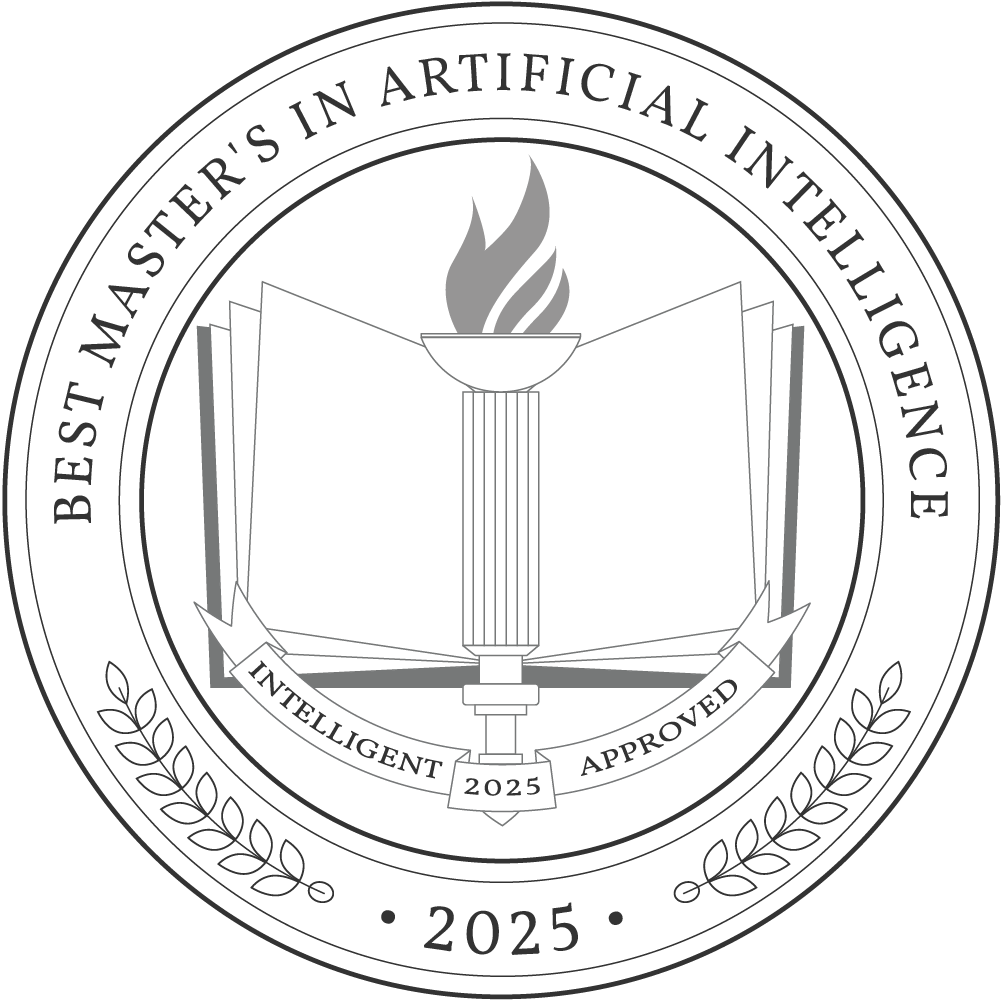Within a few short years, artificial intelligence has become a major force in society, with new uses constantly being developed and deployed in communications, technology, transportation, and more. Earning a master’s degree in artificial intelligence (AI) can prepare students for careers in this cutting-edge and fast-growing field.
According to the Bureau of Labor Statistics, the employment of computer and information research scientists, a common career for AI professionals, will grow by 23% through 2032. The median annual salary for this profession is $145,080. A master’s in AI can also prepare graduates to work as data scientists, a field that’s expected to see a 35% increase in employment over the next decade and has a median annual salary of $108,020.
A master’s degree in artificial intelligence or a related field can take one to three years to complete, depending on the specific type of degree and the pace of the program. According to the Education Data Initiative, the average cost of a master’s degree in the U.S. is $59,684, although a number of factors influence how much a specific student pays at a given institution.
Why Trust Us
The Intelligent.com Higher Education Team is dedicated to providing students with independent, equitable school and program rankings and well-researched resources. Our expert-driven articles cover topics related to online colleges and programs, paying for school, and career outlooks. We use data from the U.S. Department of Education’s College Scorecard, the National Center for Education Statistics, and other reputable educational and professional organizations. Our academic advisory team reviews content and verifies accuracy throughout the year for the most current information. Partnerships do not influence rankings or editorial decisions.
- Analyzed over 2,000 national, accredited, and nonprofit colleges and universities
- 800+ rankings pages are reviewed and updated yearly
- Content is informed by reputable sources, surveys, and interviews with academic advisors and other experts
- Over 100 data points are reviewed for accuracy and quality throughout the year, including sources
How we rank schools
Our list features the best Master’s in Artificial Intelligence degree programs at top colleges nationwide. Each school featured is a nonprofit, accredited institution — either public or private — with a high standard of academic quality for post-secondary institutions.
We evaluated each school’s program on tuition costs, admission, retention and graduation rates, faculty, reputation, and the student resources provided for online students. We collected data from trusted sources like the National Center for Education Statistics, individual school and program websites, school admissions counselors, and other data sources. Then, we calculated the Intelligent Score on a scale of 0 to 100 based on the following criterion:
Academic Quality:
- Admission rate versus enrollment rate
- Retention rate of students who return after year one
- Accreditation status (regional and programmatic)
- Nonprofit status, both private and public institutions
Graduation Rate
- Overall graduation rate
- Total number of currently enrolled students, including diversity metrics
- Student-to-faculty ratio
Cost and ROI
- In-state and out-of-state per-credit tuition rates and fees
- Required credits to graduate
- Earning potential after graduation
- Availability of federal student loans, scholarships, and other financial aid options
Student Resources
- Available student services for online-only and hybrid programs
- On-campus amenities like tutoring centers and the number of libraries
Read more about our ranking methodology.
Best 11 Accredited Master’s Degree in Artificial Intelligence Programs
FiltersInstitution Type
Status
- Intelligent Score
- Alphabetically By University Name
- Acceptance Rate
- Enrollment
- In-state Graduate Tuition
- Out-of-state Graduate Tuition
- In-state Undergraduate Tuition
- Out-of-state Undergraduate Tuition

University of Pennsylvania
Intelligent Score: 99.52In-state: $53,166
Out-of-state: $53,166
In-state: $37,678
Out-of-state: $37,678
SAT: 1460-1570
ACT: 33-35
$2,621
On-Campus
Middle States Commission on Higher Education
30

Carnegie Mellon University
Intelligent Score: 96.90In-state: $57,560
Out-of-state: $57,560
In-state: $46,441
Out-of-state: $46,441
SAT: 1460-1560
ACT: 33-35
$756
On-Campus
Middle States Commission on Higher Education
195

Stanford University
Intelligent Score: 96.60In-state: $55,473
Out-of-state: $55,473
In-state: $54,315
Out-of-state: $54,315
SAT: 1420-1570
ACT: 31-35
$1,356 - $1,391
On-Campus
Western Association of Schools and Colleges Senior College and University Commission
45

UCLA Samueli School of Engineering
Intelligent Score: 96.27In-state: $11,442
Out-of-state: $41,196
In-state: $11,442
Out-of-state: $11,442
SAT: 1310-1530
ACT: 30-35
Resident: $1,007
Non-Resident: $1,846
On-Campus
Western Association of Schools and Colleges Senior College and University Commission
36

USC Viterbi
Intelligent Score: 95.75In-state: $12,288
Out-of-state: $33,528
In-state: $13,737
Out-of-state: $13,737
SAT: 1140-1340
ACT: 25-31
$2,424
On-Campus
Western Association of Schools and Colleges Senior College and University Commission
32

Northeastern University
Intelligent Score: 95.72In-state: $54,360
Out-of-state: $54,360
In-state: $25,264
Out-of-state: $25,264
SAT: 1410-1540
ACT: 33-35
$1,785
On-Campus
New England Commission of Higher Education
32

Duke University
Intelligent Score: 95.29In-state: $55,880
Out-of-state: $55,880
In-state: $57,900
Out-of-state: $57,900
SAT: 1470-1570
ACT: 34-35
$2,529
On-Campus, Online
Southern Association of Colleges and Schools Commission on Colleges
30

Cornell University
Intelligent Score: 94.62In-state: $58,586
Out-of-state: $58,586
In-state: $29,500
Out-of-state: $29,500
SAT: 1400-1540
ACT: 32-35
$1,966
On-Campus
Middle States Commission on Higher Education
30

Northwestern University
Intelligent Score: 94.25In-state: $58,227
Out-of-state: $58,227
In-state: $56,067
Out-of-state: $56,067
SAT: 1430-1550
ACT: 33-35
$2,291
On-Campus
Higher Learning Commission
48

Kennesaw State University
Intelligent Score: 93.76In-state: $4,450
Out-of-state: $15,704
In-state: $5,328
Out-of-state: $5,328
SAT: 1030-1200
ACT: 19-25
In-State: $296
Out-of-State: $1,066
On-Campus, Online
Southern Association of Colleges and Schools Commission on Colleges
30

University of Cincinnati
Intelligent Score: 90.92In-state: $9,723
Out-of-state: $25,057
In-state: $13,224
Out-of-state: $13,224
SAT: 1120-1330
ACT: 23-29
Resident: $746
Non-Resident: $1,333
On-Campus
Higher Learning Commission
30
How to Choose a Master’s in Artificial Intelligence Degree Program
Step 1: Choose your area of study
Students pursuing a master’s in artificial intelligence have a variety of options when it comes to their specific degree and specialization options. Gaining clarity on what you want to get out of your AI master’s program in terms of skills, knowledge, networking connections, and career opportunities is key to finding the program that’s right for you.
One decision to consider early is whether you want a Master of Science or a Master of Engineering, the two most common advanced degrees for AI professionals. Students should also explore the different major and specialization options, including artificial intelligence, machine learning, robotics, data science, and more.
Now is also an ideal time to consider what your logistical needs are. Can you commit to a full-time program, or will you need to enroll part-time? Is a fully in-person program feasible, or would a hybrid remote/in-person program work better? Can you relocate, or do you need to focus your search on programs in your area?
The more specific you can be in your seeking, the easier the following steps will be.
Step 2: Research schools and programs
Once you know what you’re looking for, you can research programs to see which ones fit your needs.
In addition to your specific parameters, there are a few things everyone should look for when evaluating programs, including institutional accreditation. U.S. schools have one of two types of accreditation — regional or national. Degrees from regionally accredited schools are more widely accepted by employers and other schools, as regional accreditation standards are stricter than national standards.
Some individual AI master’s programs may also be accredited by ABET, a nonprofit agency that accredits computing, engineering, and tech-related degree programs. While earning an ABET-accredited degree is usually not a prerequisite for job eligibility, it can signify to employers that your program was held to high academic standards.
When researching programs, asking the following questions can help you determine if the program is a good fit:
- What specialization and elective options does the program offer?
- Who are the faculty, and what are their areas of expertise?
- Does the program have internship or experiential learning components?
- What is the culture of the AI department and the institution overall?
- What academic, career, and health support services does the school provide?
Much of this information may be available on the school or department website. However, students can also contact program representatives directly via phone, email, or social media to learn more. Attending an in-person or virtual open house can also provide more information about a particular program.
Step 3: Prepare for applications and tests
As you research details about your programs of interest, gather information about their eligibility requirements, application procedures, and deadlines. This information will differ between schools, so using a spreadsheet or calendar to keep it all straight can be helpful.
AI master’s programs typically seek students with an educational or professional background in AI or a related field like computer science, mathematics, or computer engineering. They may have requirements for undergraduate GPA or specific undergraduate coursework to ensure students can handle the academic rigor of their graduate program.
In general, an application for an AI master’s degree will consist of the following:
- Application form
- Official transcripts from all colleges previously attending
- Letter(s) of recommendation
- Personal statement
- GRE scores
Step 4: Select your program
Once you’ve collected all your information and determined which programs suit your needs, you can start submitting applications. There’s no magic number of programs to apply to. Because of the specialized nature of AI master’s programs, some students will only apply to one or two programs, while others may submit more applications to increase their chances of admission.
Keeping track of application deadlines is important, as missing due dates can impact admissions decisions. While some programs offer multiple start terms throughout the academic year, others only admit students once. Missing application deadlines can force students to delay the start of their programs.
Step 5: Determine how you’ll pay for your degree
Another crucial piece of information students should gather during their research process is the program’s cost, including tuition, fees, room and board (if needed), and transportation costs. They should also research what type of institutional financial aid is available, including scholarships, fellowships, grants, work-study, and more.
Graduate students should complete the Free Application for Federal Student Aid (FAFSA), which schools use to determine eligibility for various forms of financial aid, including federal student loans.
There are several other avenues students should explore for funding their degrees, including scholarships from outside organizations, tuition discounts for military service members and veterans, and tuition assistance benefits from employers.
What Can You Expect From a Master’s in Artificial Intelligence Degree Program?
As an advanced degree, a master’s in AI will help students deepen and broaden their knowledge of AI and related concepts, including deep learning, natural language processing, programming, data mining and analysis, and more.
The specific format and instruction methods an AI master’s program uses depend primarily on whether students are earning a Master of Science (MS) or a Master of Engineering (MEng), the two most common AI degrees. MS degrees are typically rooted in research and theory, with students completing a thesis as part of their curriculum requirements. Program duration varies, but usually, an MS takes 2-3 years to complete.
Meanwhile, MEng degrees focus on developing practical and professional skills and require students to complete more project-based work. These programs usually last 1-2 years.
Students can prepare for a career in AI through various degree programs due to the field’s interdisciplinary nature. Besides AI, students can major in a related subject such as machine learning, computer science, robotics, or data science, depending on their interests and career aspirations.
Outside of classes and projects, many AI master’s programs include an internship component, where students get hands-on experience in the professional AI world.
Potential courses you’ll take in an artificial intelligence master’s degree program
- AI Engineering: Topics include supervised learning, feed-forward neural networks, flow graphs, dynamic computational graphs, convolutional neural networks, and recurrent neural networks. Students will use high-level tools to engineer functioning machine learning models.
- Data Analysis: Introduces students to methods and tools used for data collection, storage, manipulation, analysis, and visualization. Technical aspects may include types of data and methods of sourcing data.
- Deep Learning: Helps students develop an understanding of both the mathematical theory and programmatic implementation of neural networks using programming languages.
- Ethics: Covers the legal, societal, and ethical implications of deploying AI technologies and helps students develop a framework for handling these issues.
Master’s Degree in Artificial Intelligence Frequently Asked Questions
How do I apply to a master's in artificial intelligence degree program?
Each master’s in AI degree program has its own specific application processes and eligibility criteria for applicants. Review admissions requirements carefully before starting an application to ensure you’re qualified, and contact the school’s admissions office if you have questions.
Because a master’s is an advanced degree, most programs expect students to have some familiarity with AI and its related fields. Programs may require students to have some combination of the following:
- Bachelor’s degree in a particular major, such as AI, computer science, mathematics, data science, etc.
- Undergraduate coursework in AI-related topics
- Professional experience in AI or a related field
- A minimum undergraduate GPA (overall or in specific courses)
How much does a master's degree in artificial intelligence cost?
According to the Education Data Initiative, the average cost of a master’s degree in the U.S. is $59,684. For students specifically seeking a Master of Science, the average cost is a little lower, at $57,770.
However, there are a number of factors that impact the cost of a master’s in AI degree. The most important consideration is whether a school is public or private and, if it’s public, whether you’re paying in-state or out-of-state tuition. Generally, in-state students at public universities pay the lowest tuition, while private school and out-of-state public university students pay more.
Students should also consider that the sticker price for a degree program is rarely what they end up paying out of pocket. Scholarships, grants, tuition assistance benefits, and discounts can all help students lower the cost of their AI master’s degree.
How long does it take to earn a master's degree in artificial intelligence?
The length of time it takes to complete a master’s in AI program varies depending on the type of degree you’re seeking and the total number of credits required.
The minimum number of credits required for a master’s degree is 30. Many professional degrees, like a Master of Engineering (MEng), tend to be 30-36 credits and can be completed in 1-2 years of full-time study.
Meanwhile, a Master of Science (MS) may require up to 65 credits. These programs may take students 2-3 years to finish when enrolled on a full-time basis.
Students who enroll part-time can expect to take additional time to graduate. Students should consider program length and what their enrollment status will be when selecting a program.
How hard is a master's in AI degree?
Because master’s degrees focus on advanced, in-depth skill mastery, these programs typically expect students to have a basic-to-intermediate understanding of key AI concepts and skills, like computer science, linear algebra, probability and statistics, algorithms, programming, and more. The more comfortable students are with these foundational skills, the easier time they’ll have in their master’s program.
A number of soft skills are also needed to succeed in AI master’s programs and careers, including analytical thinking, creative problem-solving, attention to detail, collaboration, and communication.
Another key factor in how challenging an AI degree program will be is your commitment and motivation. AI master’s programs can be demanding, so it’s important to set yourself up for success by ensuring you can focus time and energy on your coursework.
Is a master's in AI degree worth it?
There are numerous potential benefits to earning a master’s degree in AI.
Many mid and senior-level AI jobs require that candidates have a master’s degree because of the advanced or specialized nature of the job’s responsibilities. Earning a master’s in AI can demonstrate to potential employers that you have the required skills and knowledge to fulfill these roles.
Students in AI master’s programs may also get access to certain experiences and opportunities, like internships, labs, research projects, and more. They can also use their time in the program to build their professional networks with faculty, classmates, researchers, and others, leading to employment and mentorship opportunities.
Should I get a master's in AI degree in person or online?
Whether a student should earn their master’s in AI degree online or in person is another personal choice that depends on a few factors.
Online programs offer more flexibility and convenience than traditional in-person programs, which may make them more accessible for students who are working, caring for kids or other family members, or unable to relocate. They can also be more affordable, saving students money on transportation costs and lost wages.
However, online learning may not be for everyone, particularly students who learn best through real-time discussions and hands-on learning. If you’re considering an online program, research the instruction methods courses use to ensure they align with your learning styles and preferences.

